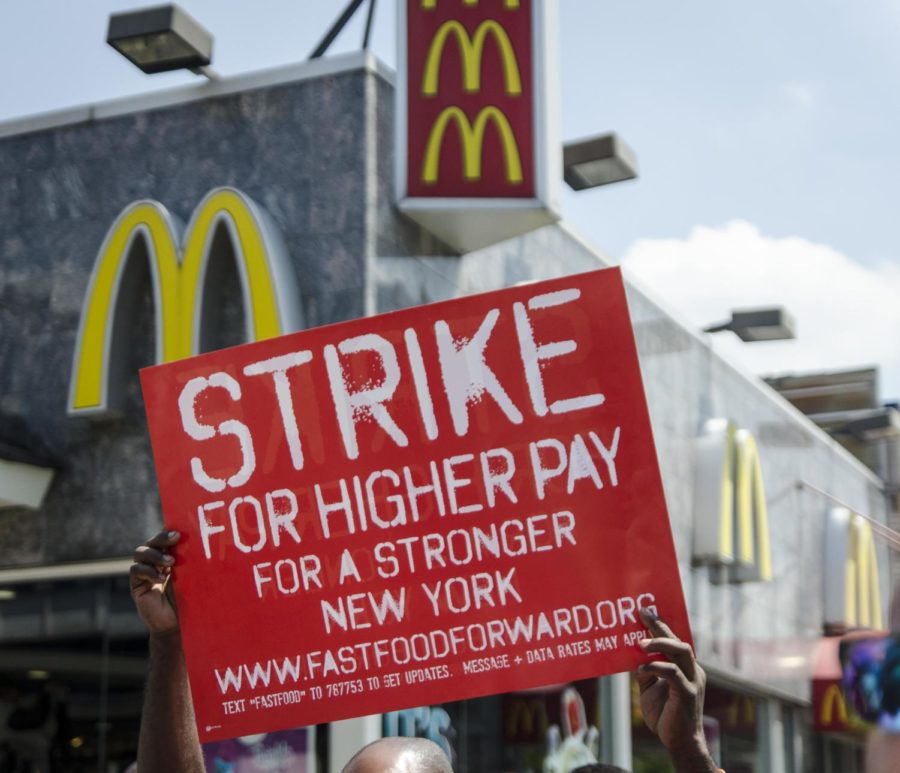Snyder: Minimum wage increase helps workers in poverty
Minimum wage increases may not be the whole answer to the poverty issue in the United States, but that doesn’t mean that it couldn’t be a piece of the solution.
December 9, 2014
Last week on Thursday, Dec. 4, thousands of minimum wage workers in nearly 200 cities continued their fight to raise the federal minimum wage from $7.25 to $10.10 per hour. President Obama recently showed his support for these and every other minimum wage earner in the United States by issuing an executive order to raise the minimum wage for federally contracted workers.
“In the wealthiest nation on Earth, nobody who works full time should have to live in poverty—nobody, not here in America,” says President Obama.
The order comes as a result of—as many orders do—the perceived failings of Congress to get—almost literally—anything done. While executive orders may not be the preferred method of progress, as the availability of such actions are, in my opinion, a flaw in our political process, I see the upward movement of the minimum wage as a positive step for both United States citizens and our nation’s economy.
Those who oppose an increase to the federal minimum wage cite multiple societal ills in their arguments, such as job loss in minimum wage positions, decline in small business growth, benefits for only a small group or only for the American youth and increased market prices (in response to wage increases).
It should also be noted that for some, dissent also stems from an opinion that there should be no federally mandated minimum wage, and while that topic in of itself merits discussion, I will have to look past it for the purposes of this column.
The argument against a minimum wage increase due to job loss is as follows: When wages increase, big employers will seek to hire a smaller, but more optimized workforce in order to keep costs down. So while those employees will be making more money, far less people will be employed.
However, according to the academic findings in the paper “Why Does the Minimum Wage Have No Discernible Effect on Employment?”, written by the Center for Economic Policy and Research, minimum wage increases have no significant effect on employment rates.
“Economists have conducted hundreds of studies of the employment impact of the minimum wage. Summarizing those studies is a daunting task, but two recent meta-studies analyzing the research conducted since the early 1990s concludes that the minimum wage has little or no discernible effect on the employment prospects of low-wage workers,” says the CEPR.
CEPR studies believe this may be due to the fact that cuts are more frequently made to the hours of employees rather than the total number of employees themselves, but the CEPR sees gains for wage earners even in these circumstances.
“Imagine, for example, that the minimum wage increased wages by 20 percent and lowered the number of hours worked by 10 percent. A part-time worker working, say 20 hours per week, would experience a 10 percent fall in hours to 18 hours a week, but would be paid 20 percent more for each of these 18 hours worked, for a net increase in weekly pay of eight percent,” says the CEPR.
Where small business growth is concerned, the United States Department of Labor found in June 2014 that “more than three out of five small business owners support increasing the minimum wage to $10.10.” The Department of Labor also dispels the idea that these increases will simply become spending money for teenagers, saying “88 percent of those who would benefit from a federal minimum wage increase are age 20 or older, and 55 percent are women.”
A large—and ever growing—percentage of minimum wage earners would be using this money to support families and maintain their housing.
The last argument I cited is the argument that says increasing minimum wage would increase prices elsewhere is actually the most well-founded. However, the argument does not take into account the fact that inflation is already occurring, regardless of what the minimum wage is doing.
Therefore, while Congress holds serve on increasing minimum wage, even those cents in $7.25 have become less and less valuable in recent years. The Department of Labor says that “the cost of living is always rising,” so “the value of a new minimum wage begins to fall from the moment it is set.”
This issue is not about the greed or entitlement of the American worker. This is about earning a paycheck, which is fair and that brings minimum wage earners closer to meeting their economic needs.
When it comes to bringing Americans above the poverty line, studies have shown that an increase of around two dollars would bring only about 11 percent of people above the poverty line. These studies have been used to argue against the minimum wage increase, but what is it exactly about 11 percent of people rising above the poverty line that can be seen as a bad thing?
Minimum wage increases may not be the whole answer to the poverty issue in the United States, but that doesn’t mean that it couldn’t be a piece of the solution.







